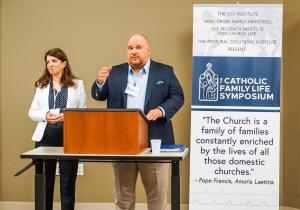Are you feeling tired? Uninspired? Like there’s too much to do? You’re not alone. These are all typical signs of the very common experience of burnout. But the good news is, you can overcome burnout and build your resilience in your every day life just by making a few simple changes.
Theology of The Body reminds us that although the world is fallen, God is working through us to build the kingdom or set the world on fire. That rebuilding starts in our lives and our relationships. Sometimes that job can feel too hard, like we can’t do it on our own, and of course we can’t. But there are a few tips we can draw from the Theology of the Body to persevere even when we feel burned out. First we need to keep our eyes, not on what’s in front of us, but rather on how God wants to work through us to make the situation into what he wants it to be. Second, we need to remember that it isn’t all up to us. We need to keep bringing the situation to God and asking him to help us discern the next small step. Third, we need to lean into virtue. We need to prayerfully ask, “What are the virtues or strengths we need to apply to this situation to glorify God in our response?” Fourth, we need to look at failure–not as a closed door–but as feedback that we bring back to prayer and then leads us back thought these steps until we find the solution. If we can work this process, we can fulfill the promise that St Paul makes in Romans 8:28 that to those who love God, all things work to the good.
Here are three, small, concrete changes that will help you overcome burnout and build your resilience:
1. Center Yourself– When you’re struggling to recover from a setback or disappointment, before doing anything else, the first step has to be centering yourself. First, bring the situation to God, pray, “Lord, help me rest in you, trust in your grace, and gather the resources and support I need to make a plan and see this through.” Then refocus on yourself on a goal–any goal–that represents the next small step you can take. You’ll feel less like running away if you can identify the next step forward and focus on gathering the resources to help you take that next step.
2. Get Out of the Tunnel–We often find it hard to bounce back from disappointments because tunnel vision causes us to get stuck trying to find the ONE BIG THING we can do to solve this problem ONCE & FOR ALL. Especially with more complicated situations, there is rarely one thing you can do to make the problem disappear. Instead, concentrate on the next small thing you can do to EITHER address the problem OR insulate yourself from the problem OR BOTH. Focusing on small steps you can take in several areas– instead of searching for ultimate answers to the one big question–allows you to come out of the tunnel and begin to see new options on the horizon.
3. Make A “Got It Done” List–We all know about To-Do lists but what about making a “Got it Done” list? Sometimes we struggle with bouncing back from a problem or setbacks because we feel like we’re just not up to the challenge. You can combat these feelings by intentionally calling to mind–and better yet, writing down–all the PAST times in your life when you were sure you weren’t up to a challenge but, through God’s grace and your good efforts, you managed to succeed. Making a “Got It Done List: will help you remember that you have conquered many difficult situations before and remind you that between you and God, there is nothing you can’t handle moving forward.
For more on overcoming burnout and effectively handling the stress in your life, check out Unworried—A Life Without Anxiety and visit us online at CatholicCounselors.com.









